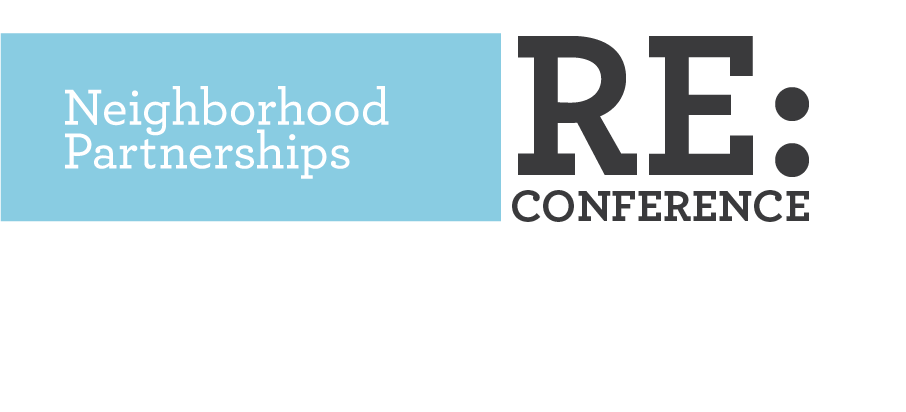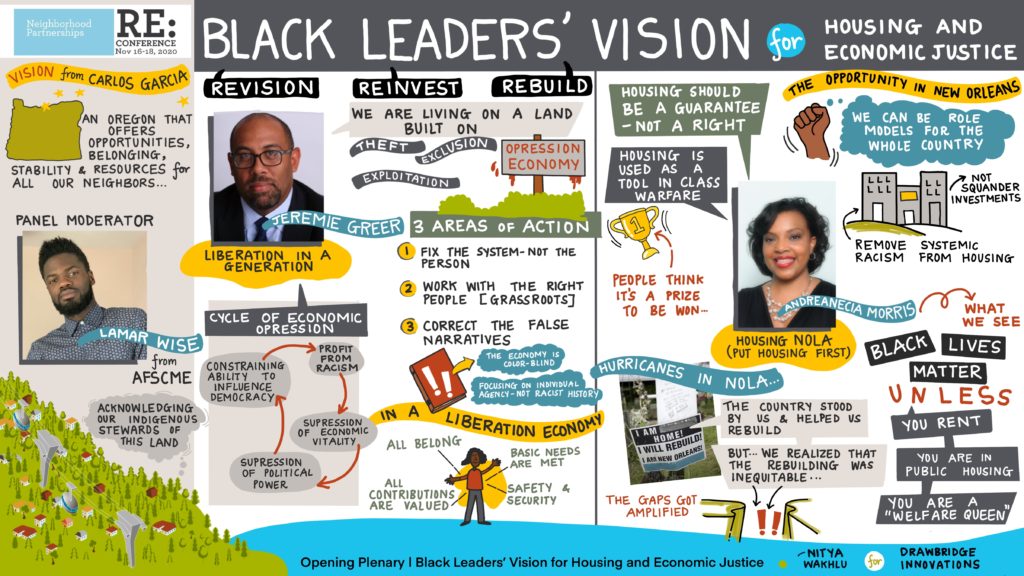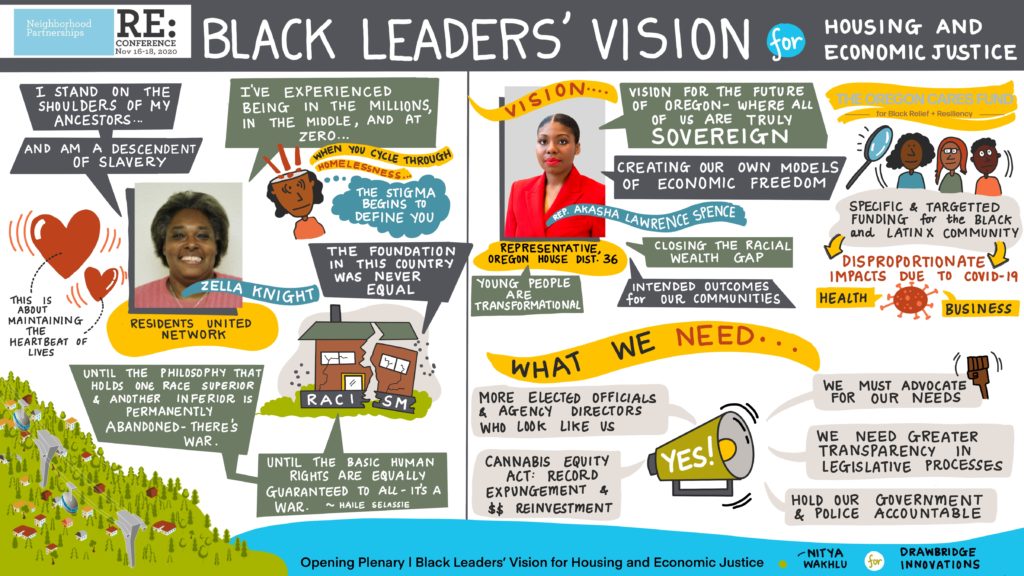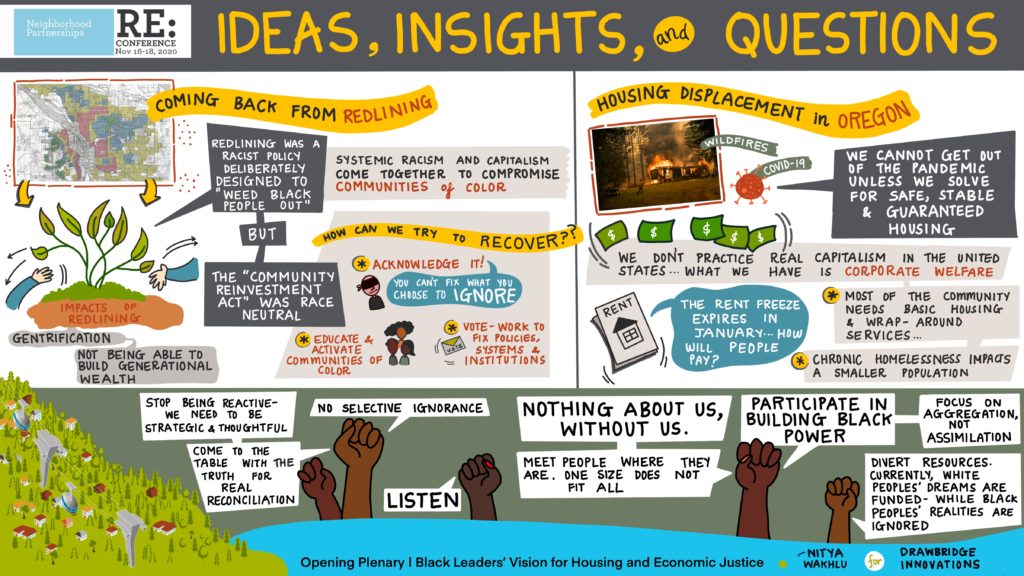
In a year of a pandemic, long overdue racial justice uprising, and wildfire, it was powerful and moving to find that our first virtual RE:Conference could bring so many of us together to make real connections in our work to move toward economic and housing justice. Here at Neighborhood Partnerships we feel grateful and humbled to have shared company with such visionary and inspired leaders, learners, and advocates.
The November convening brought partner organizations, local and national leaders from government, nonprofits, and community based organizations together to have conversations surrounding economic justice, housing, and race in Oregon. 2020 has made clear the many cracks and shortcomings in the foundation of economic opportunity and housing security for many families and individuals, particularly those from communities of color.
On Day 1, we were thrilled to feature leaders of Residents Organizing for Change (ROC) to work with conference attendees to visualize and illustrate what home looks, feels, and sounds like. We looked at the language we find ourselves using, identified room for improvement, and considered alternatives to our existing narratives of home. Using recent research, we reached for a vision that will resonate both with folks who make up our base of strong advocates for a safe, stable, and affordable place to call home, and also bring in more support by telling a compelling and inclusive story.
Our Opening Plenary gave the stage to an amazing panel of Black leaders working on the path to a liberation economy. Speakers from across the country and our local communities helped us better see the ways that the very foundation of our nation was not equal. These visionary speakers managed at the same time to provide hope in real proposals and real world efforts that are building toward accountability, leveraging the transformational power of our BIPOC youth, and identifying where our best efforts need to go.
Day 2 took a deep dive into the history of systemic racism in housing and land use policies and built off the narrative training from the previous day. “North/Northeast Portland historically was a Black community that was threatened by years of discriminatory policies and processes, and that is what led to the displacement and disinvestment of money in this particular area,” said Kymberly Horner, Executive Director of Portland Community Reinvestment Initiatives. The conversation on narrative change continued into Day 3, with a powerful session on the ways stories and culture are essential to how we build power. Speakers asked us to think about who they are building power for—and who is excluded by them. As on each day the hard truth was raised that systemic racism is a constant underpinning to the injustice of our economic, cultural, and housing realms—and that this racism impacts all of us and impedes our ability to make positive change.
In our closing plenary on community economic and housing justice, MRG Foundation Executive Director, Se-ah-dom Edmo, stated that “In movement, narrative is our superpower,” connecting the threads that ran throughout the rich tapestry of the conference. The plenary highlighted the work of Oregon efforts to address what OHCS Director of Housing Stabilization, Andrea Bell called a “tsunami of hurt and destabilization.” This blaze of harm to our communities has been deepened by the pandemic and wildfires, but is fueled by the underbrush of centuries of neglect toward the needs and visions of indigenous and Black communities and other people of color.
The conversations we had were necessary and rich, and the discussion is far from over as an eviction moratorium extension hangs in the balance, and so many of our neighbors fall to this virus, and to the rising toll of lost work and an inadequate government response. As we consider how we frame our narratives, our advocacy, and the work we engage with our partners statewide, we at Neighborhood Partnerships will continue to put all our efforts toward an Oregon where everyone has a safe, stable and affordable place to live, and where we all can have the financial stability and resources to reach for our goals.
See you next year. Until then, please feel welcome to dig in to the fine resources from this year’s RE:Conference here complete with recorded sessions and supplemental information.



